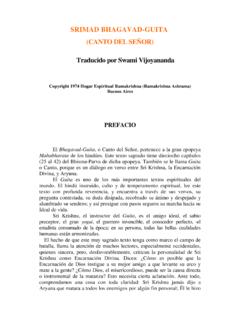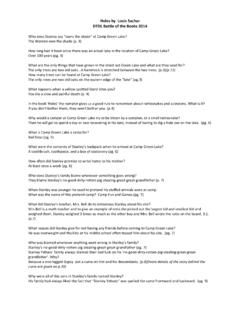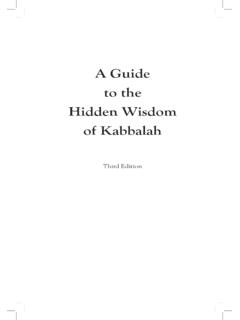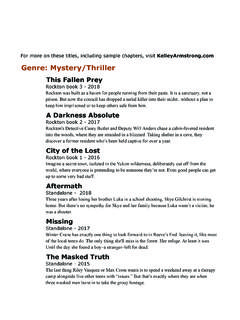Transcription of Swami Vivekananda - A Biography by Swami …
1 Swami Vivekananda - A Biography by Swami Nikhilananda PREFACES wami Vivekananda 's inspiring personality was well known both in India and in America during the last decade of the nineteenth century and the first decade of the twentieth. The unknown monk of India suddenly leapt into fame at the Parliament of Religions held in Chicago in 1893, at which he represented Hinduism. His vast knowledge of Eastern and Western culture as well as his deep spiritual insight, fervid eloquence, brilliant conversation, broad human sympathy, colourful personality, and handsome figure made an irresistible appeal to the many types of Americans who came in contact with him.
2 People who saw or heard Vivekananda even once still cherish his memory after a lapse of more than half a century. In America Vivekananda 's mission was the interpretation of India's spiritual culture, especially in its Vedantic setting. He also tried to enrich the religious consciousness of the Americans through the rational and humanistic teachings of the Vedanta philosophy. In America he became India's spiritual ambassador and pleaded eloquently for better understanding between India and the New World in order to create a healthy synthesis of East and West, of religion and science. In his own motherland Vivekananda is regarded as the patriot saint of modern India and an inspirer of her dormant national consciousness.
3 To the Hindus he preached the ideal of a strength-giving and man-making religion. Service to man as the visible manifestation of the Godhead was the special form of worship he advocated for the Indians, devoted as they were to the rituals and myths of their ancient faith. Many political leaders of India have publicly acknowledged their indebtedness to Swami Vivekananda . The Swami 's mission was both national and international. A lover of mankind, he strove to promote peace and human brotherhood on the spiritual foundation of the Vedantic Oneness of existence. A mystic of the highest order, Vivekananda had a direct and intuitive experience of Reality.
4 He derived his ideas from that unfailing source of wisdom and often presented them in the soul-stirring language of poetry. The natural tendency of Vivekananda 's mind, like that of his Master, Ramakrishna, was to soar above the world and forget itself in contemplation of the Absolute. But another part of his personality bled at the sight of human suffering in East and West alike. It might appear that his mind seldom found a point of rest in its oscillation between contemplation of God and service to man. Be that as it may, he chose, in obedience to a higher call, service to man as his mission on earth; and this choice has endeared him to people in the West, Americans in particular.
5 In the course of a short life of thirty-nine years (1863-1902), of which only ten were devoted to public activities and those, too, in the midst of acute physical suffering he left for posterity his four classics: Jnana-Yoga, Bhakti-Yoga, Karma-Yoga, and Raja-Yoga, all of which are outstanding treatises on Hindu philosophy. In addition, he delivered innumerable lectures, wrote inspired letters in his own hand to his many friends and disciples, composed numerous poems, and acted as spiritual guide to the many seekers who came to him for instruction. He also organized the Ramakrishna Order of monks, which is the most outstanding religious organization of modern India.
6 It is devoted to the propagation of the Hindu spiritual culture not only in the Swami 's native land, but also in America and in other parts of the world. Swami Vivekananda once spoke of himself as a 'condensed India.' His life and teachings are of inestimable value to the West for an understanding of the mind of Asia. William James, the Harvard philosopher, called the Swami the 'paragon of Vedantists.' Max M ller and Paul Deussen, the famous Orientalists of the nineteenth century, held him in genuine respect and affection. 'His words,' writes Romain Rolland, 'are great music, phrases in the style of Beethoven, stirring rhythms like the march of Handel choruses.
7 I cannot touch these sayings of his, scattered as they are through the pages of books, at thirty years' distance, without receiving a thrill through my body like an electric shock. And what shocks, what transports, must have been produced when in burning words they issued from the lips of the hero!' EARLY YEARSS wami Vivekananda , the great soul loved and revered in East and West alike as the rejuvenator of Hinduism in India and the preacher of its eternal truths abroad, was born at 6:33, a few minutes before sunrise, on Monday, January 12, 1863. It was the day of the great Hindu festival Makarasamkranti, when special worship is offered to the Ganga by millions of devotees.
8 Thus the future Vivekananda first drew breath when the air above the sacred river not far from the house was reverberating with the prayers, worship, and religious music of thousands of Hindu men and women. Before Vivekananda was born, his mother, like many other pious Hindu mothers, had observed religious vows, fasted, and prayed so that she might be blessed with a son who would do honour to the family. She requested a relative who was living in Varanasi to offer special worship to the Vireswara Siva of that holy place and seek His blessings; for Siva, the great god of renunciation, dominated her thought.
9 One night she dreamt that this supreme Deity aroused Himself from His meditation and agreed to be born as her son. When she woke she was filled with joy. The mother, Bhuvaneswari Devi, accepted the child as a boon from Vireswara Siva and named him Vireswara. The family, however, gave him the name of Narendranath Datta, calling him, for short, Narendra, or more endearingly, Naren. The Datta family of Calcutta, into which Narendranath had been born, was well known for its affluence, philanthropy, scholarship, and independent spirit. The grand father, Durgacharan, after the birth of his first son, had renounced the world in search of God.
10 The father, Viswanath, an attorney-at-law of the High Court of Calcutta, was versed in English and Persian literature and often entertained himself and his friends by reciting from the Bible and the poetry of Hafiz, both of which, he believed, contained truths unmatched by human thinking elsewhere. He was particularly attracted to the Islamic culture, with which he was familiar because of his close contact with the educated Moslems of North-western India. Moreover, he derived a large income from his law practice and, unlike his father, thoroughly enjoyed the worldly life. An expert in cookery, he prepared rare dishes and liked to share them with his friends.












